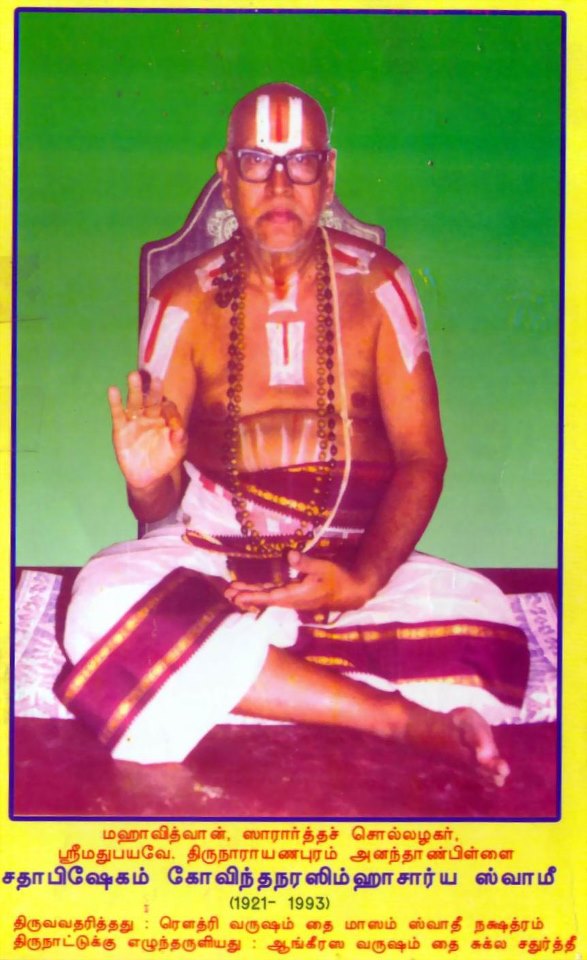Sadhaabishekam Sri U. Ve. Govinda Narasimhaachariar swamy
Thirunaryanapuram Ananthanpillai Sadhaabishekam Sri U. Ve. Govinda Narasimhaachariar swamy Thirunakshatam (Thai Swathi)
Sri Sathabhishekam Swamy, popularly known as he was, learnt the Sri Vaishnava Texts early in his childhood at Melkote and later obtained the Vyakarna Sironmani Title from the Vedha Patasala at Sriperumbudur. He had the benefit of studying the texts under the benevolent care of five Acharyas, namely, Sri Govindappangar Swamy of Sri Rangam (Pancha Samskara Acharya), Sri Elayavilli Sadagopachariar of Alwar Tirunagari, his elder brother (Arulicheyal), Sri Aasoori Ramanujacharya of Sri Perumbudur (Sanskrit Vedas), Sri Pratiwadhi Bhayankaram Annangaracharya of Kancheepuram (Rahasya Granthas), and Sri Karpangadu Venkatacharya of Tiru Mayilai (Bhagavad Vishayam and Sri Bashyam).
Sri Sathabhishekam Swamy was conferred the title of "Sarartha Sookthi Sundarar" ("sollazhagar", in Tamil, meaning beautiful exponent of inner meanings of words and phrases). He would advice that one's intention should be good, unmindful of the difficulties and self-sacrifice he may face in executing a deed. When such a person raises the step to do that deed, then the Lord would take up the responsibility on Himself to see that this person puts his foot down correctly and firmly so to reach the desired goal. If the intention is otherwise, then the Lord remains a mere spectator and the person may be thinking that he is proceeding in the right direction due to the small fruits he gets on the way, but the final doom will fall on him as in the case of Ravana and Duryodhana.
It is this conviction and Faith in Him which led to successful renovation of some Divyadesams and shrines of Alwars and Acharyas in his later days. As president of Shri Manavala Mamunigal Kainkarya Sabha, Srirangam, his zeal in this aspect resulted in the discovery of beautiful stone images of Sri Aadhinathar, the presiding deity at Alwar Tirunagari and of Swami Nammazhwar, whose works in Tamil in praise of the Lord are equated with the four sacred Vedas.
(Extract from an article by Sri K.E.B. RANGARAJAN)




